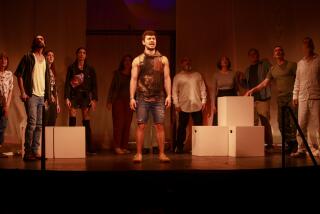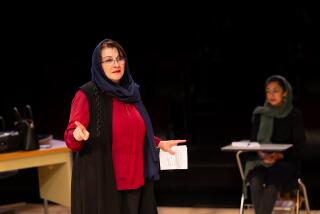Plugging Into Moliere
- Share via
IRVINE — In the 1960s, comic Bert Lahr appeared in Aristophanes’ “The Birds” at the ill-fated Ypsilanti Greek Theatre Festival in Michigan. He had signed his contract on the basis of the very funny, exuberant translation by critic Walter Kerr that he had been given. By the time Lahr reached Ypsilanti, however, the artistic director had chosen a more scholarly translation, by William Arrowsmith. Lahr was livid. “It was stilted and dull,” Lahr said. “There weren’t any jokes in it.”
UC Irvine professor of drama Robert Cohen’s reaction to that is shock. “Aristophanes without jokes?” he asks, bewildered.
Cohen, who is directing the first production of his own translation of Moliere’s “The Misanthrope” at UCI’s Concert Hall (see review, F30), knows about not retaining the humor and the style in translation. Moliere was a pretty funny playwright himself.
“It’s hardly sufficient,” Cohen says, “to translate just the meaning of the words. The semantics are an important part of the play, but only one of many important parts of the play--the tone, certainly the humor and, in the case of Moliere, the shape of the lines, the shape of the language and what people are trying to do with conversation itself.”
Moliere’s facility with conversational game-playing intrigues Cohen. The professor mentions the acclaimed French film “Ridicule,” currently in release, in which courtiers at the court of Louis XVI are engaged in these same kind of rhyming contests, not unlike Cyrano de Bergerac fighting a duel while composing a ballad. It’s almost a parlor game, almost as though the courtiers are saying, “Let’s do aphorisms in octosyllables,” Cohen says.
*
Long before the age of television entertainment, Cohen says, it was kind of a sport to speak in Alexandrian couplets, the form in which “Misanthrope” is written.
“To me,” Cohen explains, “the rhyming is very much a part of the play, because it’s not just the style of the play, it’s part of the rhetorical style of life, when people entertained themselves by creating games out of conversation itself, conversational ploys, rhetorical displays and the great tirades that Moliere was famous for writing, and performing as an actor in his own stuff.”
Although Cohen uses some language that Moliere might not have been familiar with, he says the translation has not been updated. Line for line, he explains, he has translated the play that Moliere wrote. Every line corresponds to the equivalent line in the original. But he has tried to give it a high-voltage, high-energy tone and a momentum that he frankly admits he doesn’t find in the usually staged 1954 Richard Wilbur version, which has been previously staged at UCI and at South Coast Repertory in Costa Mesa.
Cohen finds prose translations, which ignore Moliere’s couplets, universally poor.
“This is a play,” he says, “in which people really match wits, not just in what they say, but in the way they shape it.”
The Italians have a phrase, Cohen says: “ ‘The translator is the trader.’ You have all of these things you must translate--meaning, tone, theatricality. You’re always doing a trade-off from one to the other.”
The literal semantics may have a paltry tone, he says. A translator can often find phrasing that is funny but has very little to do with the meaning of the original. It’s always a matter of balancing these various aspects of a play, he explains.
In a world where one can often find numerous translations of theatrical works, why a new translation? One reason, Cohen says, is that as a college professor, it is incumbent upon him to look at each project anew, to explore.
“There are other reasons for doing a new translation,” Cohen says. “There’s the sheer excitement of it. One doesn’t do a new translation unless one thinks one can improve upon what’s out there. That’s the most important one for me.
“I looked at other translations. But I wanted to give the production my stamp. And I wanted to give it the meaning that I think it can convey to today’s audience. That seems to call for looking at it very freshly and readdressing the issues that it raises and the language it uses. So therefore, I do my own translation. And I don’t have to pay royalties.”
More to Read
The biggest entertainment stories
Get our big stories about Hollywood, film, television, music, arts, culture and more right in your inbox as soon as they publish.
You may occasionally receive promotional content from the Los Angeles Times.










